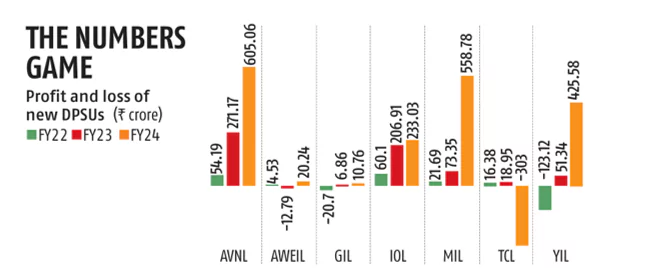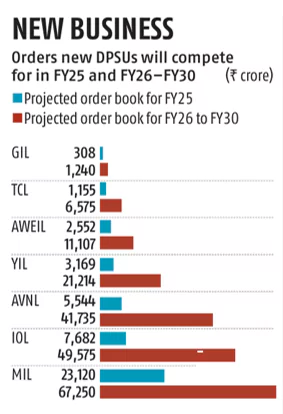Ordnance Factory Board (OFB)
OFB was corporatised on October 1, 2021, merging 41 production units into 7 new Defence Public Sector Undertakings (DPSUs). A Parliamentary Standing Committee on Defence report highlighted improvements in profitability but noted uneven future prospects.
Corporatisation refers to converting a government department into a corporate entity with a commercial structure.
Before 2021, the Ordnance Factory Board (OFB) operated as a government department, lacking financial autonomy and accountability. Corporatisation aimed to improve efficiency, ensure market competitiveness, and enhance self-reliance in defence manufacturing.
Performance of the DPSUs
- Six out of seven DPSUs reported profits in FY24.
- Armoured Vehicles Nigam Ltd (AVNL) led with ₹605.06 crore profit.
- Advanced Weapons and Equipment India Ltd (AWEIL) recovered from a loss in FY23 to ₹20.24 crore profit in FY24.
- Troop Comforts Ltd (TCL) was the only DPSU to report a loss of ₹303 crore due to a weak order book, though fresh orders worth ₹1,200 crore were placed.
Order Book and Future Growth
- Munitions India Ltd (MIL) holds the highest projected order book for FY25 at ₹23,120 crore.
- Over FY26–FY30, MIL is expected to maintain its lead with ₹67,250 crore in potential orders.
- AVNL's order book is expected to increase over sevenfold, from ₹5,544 crore in FY25 to ₹41,735 crore in FY30.
- Together, MIL, IOL (India Optel Ltd), and AVNL account for nearly 80% of the total projected order book (~₹1.99 trillion) for FY26–FY30.
- Gliders India Ltd (GIL) has the smallest projected order book.
Concept of an Order Book
- An order book is a record of confirmed purchase orders received by a company for future delivery of goods or services.
- It represents the total value of pending orders that a company has to fulfill.
- Used primarily in manufacturing, defence, and construction industries, where large-scale production is based on pre-approved contracts.

Exports and Competitiveness
- DPSU exports surged from ₹82.18 crore in FY23 to ₹1,976.51 crore in FY24 (2,300% growth).
- However, MIL alone contributed 86% of exports, and AVNL reported zero exports.
- The government is supporting DPSUs with financial and non-financial aid.
- Private sector competition (Adani Group, Kalyani Group, L&T) is expected to challenge DPSUs.

Challenges and Recommendations
- Public sector inefficiency arises from bureaucratic red tape, lack of autonomy, and slow decision-making.
- Capital expenditure (Capex) underutilization: Out of ₹5,757 crore disbursed, only ₹3,261.78 crore (57%) was utilized.
- The committee recommended modernization and technology upgrades.
-
Suggestions for the future:
- Privatisation could be an option but requires political will.
- Consolidation of 7 DPSUs into 2-3 entities for better efficiency.
- Greater autonomy to compete with private players.












